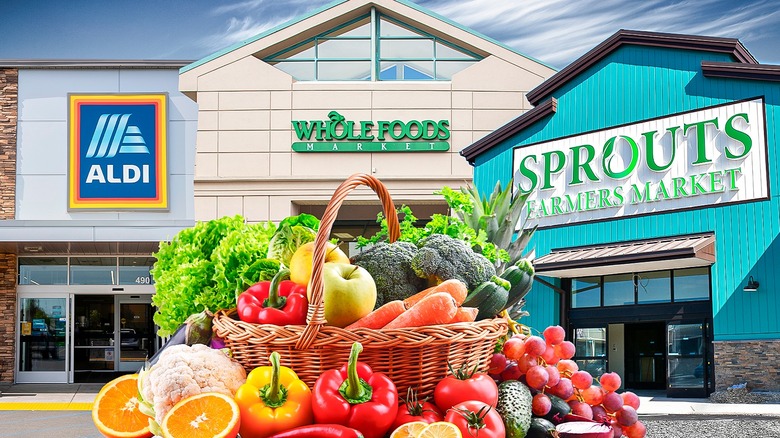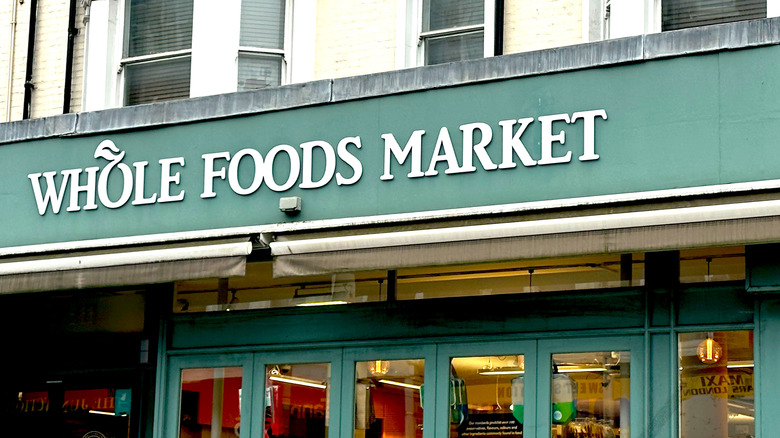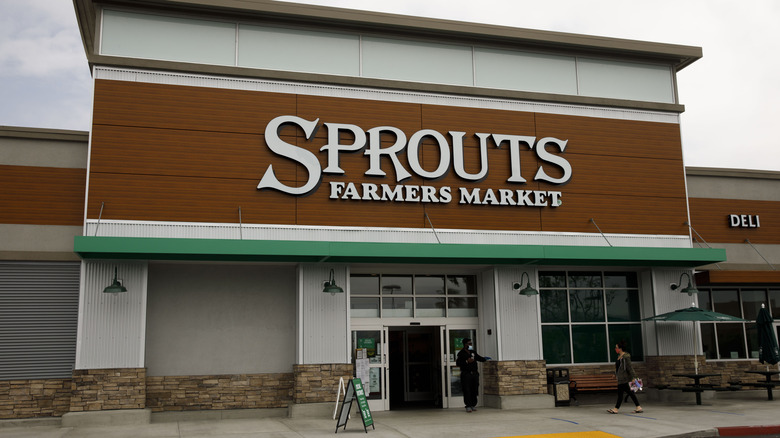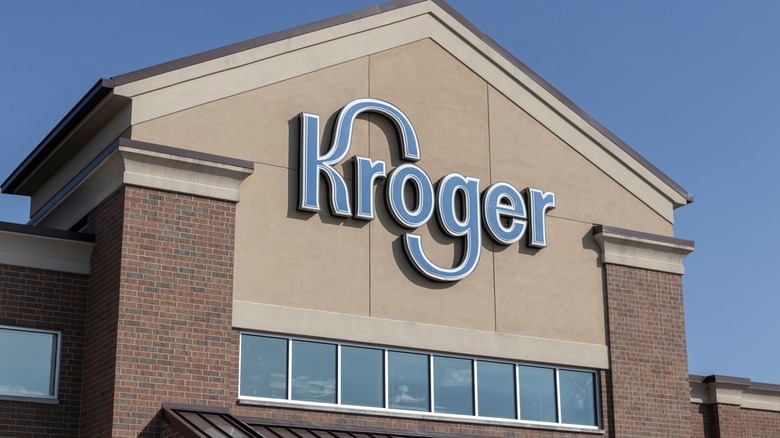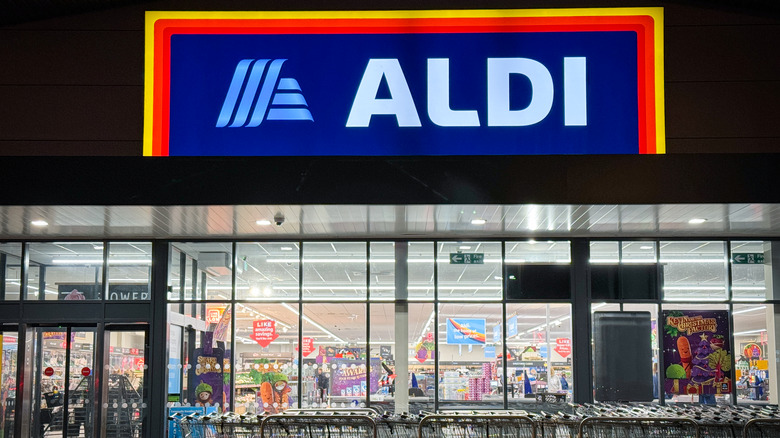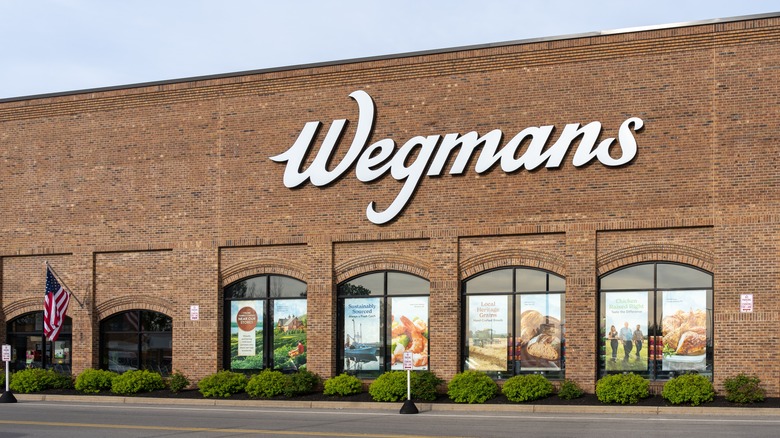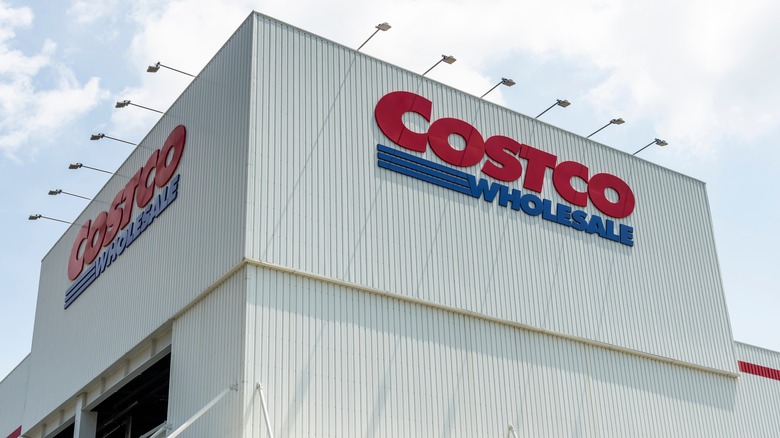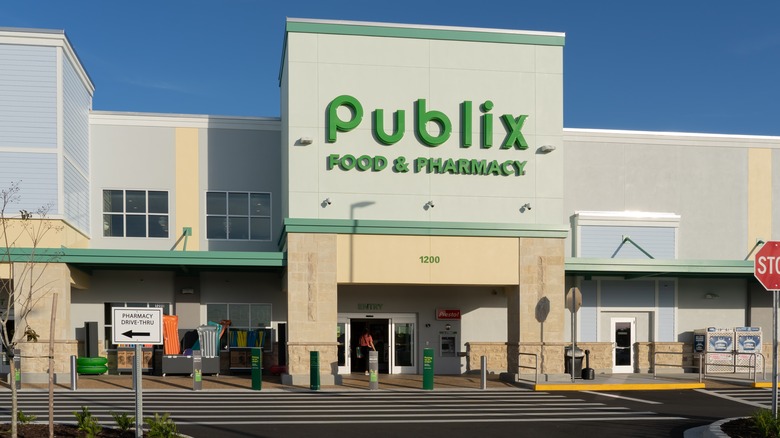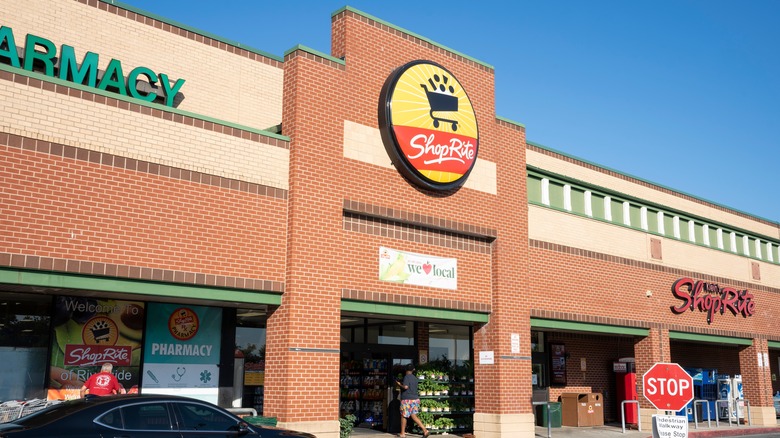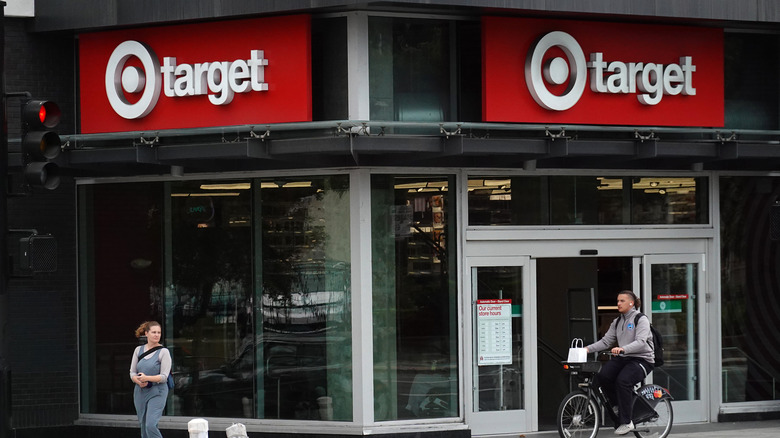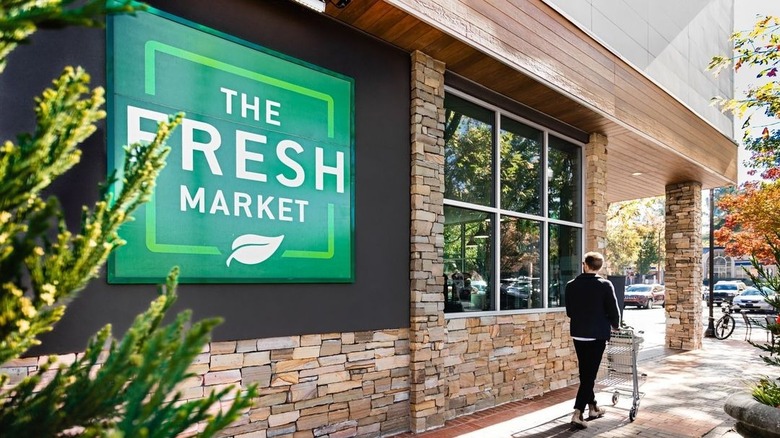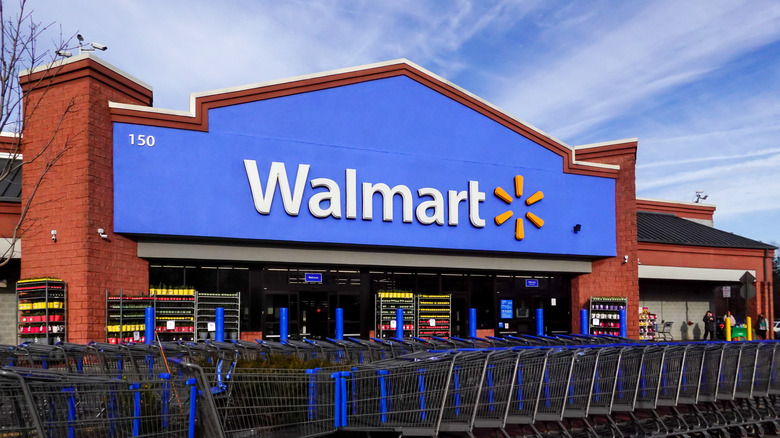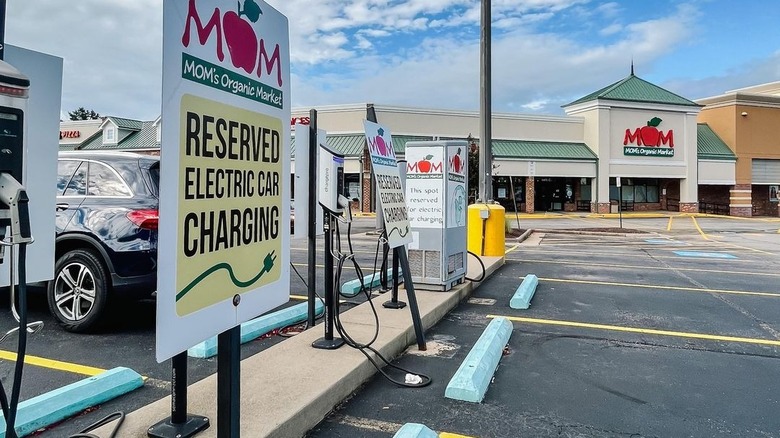The Absolute Best Grocery Store Chains For Organic Shopping In The US
We all have that friend who insists that organic shopping is better for you and the environment. That's because organic shopping has some serious perks. Research suggests eating organic can reduce the risk of metabolic syndrome, infertility, birth defects, and more. And while more research is needed to truly understand the long-term impact, shoppers are leaning in, and organic food is set to become more popular than ever.
According to the Organic Trade Association survey from May 2023, organic food sales are up 4% and account for 6% of total food sales in the U.S. According to the USDA, organic is a label on packaged food items and produce that meets specific requirements that consider environmental impact and do not allow for fertilizers, sewage sludge, irradiation, and genetic engineering. The USDA organic seal ensures that 95% or more of the product is organic. Keep in mind that organic is different than natural, and watch out for other myths about organic food that can be confusing.
But what is the best store for all your organic shopping needs? This list of the best grocery store chains for organic shopping in the U.S. is based on my experience as someone who largely shops organic and some internet research to determine what stores offer large varieties. These options all sell multiple organic products across at least two states.
1. Whole Foods
Whole Foods opened in Austin, Texas in the 1980s as a health food store and today is arguably one of the most recognizable organic grocers with over 500 stores nationwide. The chain is the first and only certified organic national grocer. This means that not only do products need to meet certain standards to be considered certified organic, such as grown without toxic persistent pesticides, but Whole Foods stores maintain additional strict standards for handling organic products to ensure they stay organic after products leave the farm and enter the stores.
For example, Whole Foods ensures that cleaning and sanitation procedures don't leave any non-organic residue on products on shelves. To ensure standards are met, the California Certified Organic Farmers inspect each Whole Foods store annually. From organic produce, meat, pantry items, dairy, frozen selections, and more, shoppers can likely find their entire grocery list organic throughout the store without questioning the quality.
2. Sprouts Farmers Market
Sprouts Farmers Market started from humble beginnings as a fruit stand in the 1940s and later evolved into a grocery store in 2002. Today, the market has over 380 stores across 23 states, with more coming soon — all specializing in natural and organic foods.
The stores are best known for high-quality produce, but you can also find fresh meat, seafood, deli items, dairy, frozen foods, supplements, pantry staples, and more. And don't miss the bulk foods department, which is also a real crowd pleaser. You can scoop coffee beans, rice, nuts, dried fruits, granola, spices, treats, and more from bins and barrels. Sprouts stores sell anything you would need with an organic label, including affordable organic products under the Sprouts private label. In fact, 90% of the 19,000 products on shelves at Sprouts are natural or organic. But beware, not all items labeled natural follow the same strict standards as something truly organic.
3. Trader Joe's
Known for unique and basic items sold under an exclusive private label, Trader Joe's has storefronts in 43 states and offers a wide selection of organic items that won't break the bank. The private label alone promises products that have been tasted and enjoyed by staff and are made without any artificial flavors, preservatives, MSG, GMOs, or partially hydrogenated oils. The organic label on many of the products sold only adds to the overall health benefits and quality.
Starting with organic unfiltered apple juice as the first organic product on shelves, the chain launched organic pantry items and produce in the 1970s. Today, Trader Joe's claims more than 20% of the products customers purchase are organic, and it's only growing. Shoppers can pick up frozen items, canned foods, produce, meat, bread, eggs, dairy products, wine, and more that are organic and meet the standards set by the National Organic Program.
4. Kroger
With nearly 2,800 stores across 35 states, Kroger is the nation's largest grocer. It's widely known as a place for innovation and is the first grocer in the U.S. to become a one-stop shop for customers by including more than just a produce department, like a designated bakery and a meat counter. Many Krogers today also sell Sushi, have a Starbucks, and so much more.
Customers can buy organic pantry items, meat, produce, dairy, eggs, frozen items, baked goods, and more at Kroger. The stores even carry the private label Simple Truth Organic for more affordable organic options. These items are produced without synthetic fertilizers, genetic engineering, sewage sludge, or irradiation. They're also free of artificial preservatives and produced by organic growers. But before buying organic food from Kroger, know that you may not get the best value. The organic offerings at Kroger tend to be pricier than those at Aldi and Trader Joe's, according to Passionate Penny Pincher Founder Laurie Hise.
5. ALDI
If you've heard of the grocery chain that requires a quarter to unlock a grocery cart, then you've probably heard of ALDI. The over 2,200 stores across 39 states are incredibly cost-conscious, only selling select products in a smaller space and requiring customers to bring their own bags. According to CNBC, ALDI offers truly competitive prices on organic products compared to Trader Joe's, Walmart, and Whole Foods.
The low price is because many of the organic products at ALDI are sold under a private label called Simply Nature, similar to the Trader Joe's model. This allows ALDI to offer the items at a lower cost compared to a name brand. These in-house branded products are organic and/or non-GMO and do not include over 125 ingredients, including artificial flavors, high fructose corn syrup, trans fats, nitrates, and more. Customers can buy organic dairy, eggs, produce, frozen foods, meat, bakery items, pantry favorites, and more under the Simply Nature organic label.
6. Wegmans
Browse the aisles of Wegmans for restaurant-ready prepared foods, elite fish and meat options, and an array of high-quality fresh produce at a very affordable price. But you can also shop one of the many private labels, Wegmans Organic, for over 4,000 products made without anything artificial or GMOs. The Wegmans Organic line launched in 2003 and includes items produced sustainably, often by local and regional organic suppliers, and follow the USDA organic standards.
Every Wegmans location offers organic produce, frozen items, meat, snacks, dairy, bread, pantry items, and more. Wegmans even has its own organic farm and orchard in New York state to help provide groceries for the over 110 stores across eight states and Washington D.C. The farms have grown over 100 types of organic crops with the goal of making markets less dependent on the West Coast, and farmers continue to trial new seeds to determine what will succeed.
7. Costco
Sure, you can stop into Costco for a discounted treadmill, cookware set, family-size bag of nuts, and a blender — all while noshing on the store's fresh hot dogs and pizza from the cafe. But the organic items on shelves are not to be missed. You can buy everyday pantry items, frozen specialties, bread, meat, and more, all under the Kirkland Organic private label or your favorite name brands.
Customers of this member-only store know Costco means business when it comes to bulk items, and you can save some serious cash stocking up. Typically, pricy organic items, like nut butter, olive oil, meat stocks, and other kitchen staples, are sold so large that you'll only need to fill your cart with them a couple of times a year. That means you can get the savings Costco shoppers like, with fewer trips to the store and the organic label you're looking for.
8. Publix
Wide aisles, friendly staff, elite prepared foods, and delicious Pub Subs aren't the only things Publix is known for. Among the 1,361 locations across seven states in the Southeast, shoppers flock to Publix for the organic products and can't-be-beat quality. The private-label brand GreenWise sells items made with at least 70% organic ingredients and no artificial preservatives, flavors, and colors. This line includes pantry items, meat, dairy, frozen items, eggs, baked goods, and more.
Organic produce and third-party organic items are also abundant throughout the store and have the USDA organic seal to differentiate them from non-organic items. Each meets regulations set by the USDA National Organic Program and includes fruits and vegetables, herbs, juices, plant-based proteins, nuts, snacks, and more. As a bonus, Publix typically has great coupons, sales, and deals on products, making it an incredibly cost-effective option, especially for those who participate in the Club Publix loyalty program.
9. ShopRite
New York, New Jersey, Connecticut, Pennsylvania, Delaware, and Maryland shoppers regularly head to the more than 270 ShopRite locations and hundreds of additional member companies under different names for organic produce and kitchen staples. The private-label brand Wholesome Pantry launched in 2016 and has everything you would need, including meat, produce, pantry items, dairy, spices, and more. These often live in a designated natural foods aisle in stores for easy identification and shopping.
Additional organic items are sold under brand names; some stores selling alcohol even have organic wine on shelves. Prices can be slightly elevated for the quality, but the Wholesome Pantry label promises all items are organic and free from artificial ingredients and additives. Plus, if you're looking for a great deal, stop by ShopRite for the iconic Can Can Sale. During the yearly winter celebration, canned, boxed, bagged, and bottled items are on major discounts and worth stocking up on.
10. Target
Head into one of Target's 1,956 stores for everything from clothes and beauty products to home decor and electronics. The possibilities are endless and in more recent years, that even includes all of your groceries — organic, too. Though Target has sold grocery products for a long time, in 2006, the chain became one of the first grocers in the U.S. to be a USDA-certified organic produce retailer. Target soon expanded its fresh food offerings in 2009 and added additional produce, meat, baked goods, and more to the shelves. This turned Tagret into a true one-stop shop.
Target's private-label Good & Gather even has an organic version with items produced without synthetic pesticides, fertilizers, or GMOs. They all meet the regulations of the USDA National Organic Program. You can fill your cart with private-label or third-party branded organic fruit, vegetables, dairy, supplements, meat, seafood, snacks, coffee, baby food, and more.
11. The Fresh Market
From Florida to New York and even out to Oklahoma and Chicago, you can find 161 Fresh Market shops all over 22 states in the eastern part of the U.S. The markets are European-inspired and sell fine foods, ready-to-heat and-eat dishes, fresh produce, butcher-cut meats, stellar seafood, bulk bin nuts and candies, and much more. The Fresh Market is well known for selling interesting and unique products, especially restaurant-like prepared food items, and a large quantity of local and organic products.
Shelves are stocked with organic produce, meat, dairy, plant-based items, frozen foods, coffee, tea, wine, and more. And though the items sold are premium quality, the price is also at a premium. But if you're willing to shell out the cash, you're in for a special treat. For some savings, shop The Fresh Market organic private-label, check weekly sales, and join the loyalty program for even more savings, rewards, and special access to experiences.
12. Walmart
Another spot where you can grab everything you need in one stop is Walmart. With 10,500 global stores, it's the largest chain store to sell groceries in the U.S. and sells organic products among electronics, pharmacy items, home necessities, beauty products, clothes, and more. Shoppers can buy their favorite third-party brand organic items or shop the organic line of Walmart's private label Great Value for even better savings. Walmart sells organic fruits and vegetables, dairy, eggs, meat, pantry staples, beverages, frozen meals, bread, and so much more.
The chain says that all packaged foods with an organic label are certified by the USDA and meet their guidelines. And though the selection may be smaller than many other organic grocers, the prices truly can't be beaten. In fact, a writer at Business Insider estimated an organic food shop at Walmart could save you about 15% compared to the same items at Whole Foods.
13. MOM's Organic Market
MOM's organic market started as a home delivery service, which turned into a produce mail order before becoming a storefront, and is a favorite among shoppers in the six states (and D.C.). Fans of the store have even been compared to a cult. MOM's is built on the core values of gratitude, lifting up others, courage, no ego, accepting things you cannot change, and purpose. The store achieves this not only through solar and wind power technology but also through regular recycling programs and local partnerships.
And, of course, the organic products. MOM's sells sustainable seafood, organic produce, meat, dairy, eggs, coffee, wine, beer, supplements, pantry items, and more. The selection follows strict standards and holds to sustainability requirements. Most importantly, none of the over 250 banned ingredients, such as artificial sweeteners, fat substitutes, flavor enhancers, color retention, preservatives, and more, are included in any of the items sold.
14. Methodology
As a health-conscious shopper, I've lived in the Northeast, Mid-Atlantic, and the South and have personally shopped organic at the listed stores. I cook often, using a large amount of organic vegetables and fruits. I have also written about nutrition and health for over seven years, so I am familiar with the stores where dietitians and other health-conscious people tend to shop. In addition, I conducted intensive internet research focusing on news articles and studies, along with fact-checking organic offerings online of major retailers to determine the selection of organic items at the listed supermarkets.
